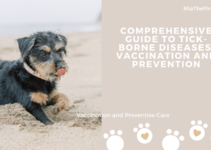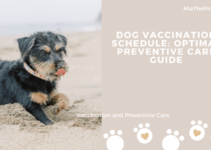The Basics of Antibodies in Dog Vaccination
When it comes to protecting our furry friends from harmful diseases, dog vaccination plays a crucial role. At the heart of this defense mechanism lies the concept of antibodies. But what exactly are antibodies?
Antibodies, also known as immunoglobulins, are proteins produced by the immune system in response to the presence of foreign substances, known as antigens. These antigens can be bacteria, viruses, or other harmful microorganisms that pose a threat to our dogs’ health.
Once a dog is vaccinated, a small, harmless portion of the antigen is introduced into their body, triggering the immune system to produce specific antibodies. These antibodies act as a defense mechanism, recognizing and neutralizing the corresponding antigen if encountered in the future.
How Antibodies Work in Preventing Canine Diseases
The primary function of antibodies is to prevent the invasion and spread of harmful pathogens within a dog’s body. When a vaccinated dog encounters an antigen, the antibodies bind to the antigen’s surface, rendering it ineffective and preventing it from causing harm.
Additionally, antibodies play a vital role in activating other components of the immune system, such as white blood cells, to eliminate the antigen. This coordinated response helps in eradicating the pathogen before it can establish an infection or cause severe illness.
Understanding the Different Types of Dog Vaccines
There are various types of vaccines available to protect dogs against different diseases. Some of the most common types include:
1. Core Vaccines: These vaccines are essential for all dogs and protect against diseases that pose a significant risk to their health, such as rabies, distemper, parvovirus, and adenovirus.
2. Non-Core Vaccines: These vaccines are recommended based on a dog’s lifestyle, geographic location, and potential exposure to specific diseases. Examples include vaccines for Lyme disease, Bordetella, and Leptospirosis.
3. Combination Vaccines: These vaccines combine multiple antigens into a single injection, reducing the number of shots required and simplifying the vaccination process.
The Importance of Vaccination Schedules and Boosters
A well-planned vaccination schedule is crucial to ensure optimal protection for our canine companions. Puppies typically receive a series of vaccinations starting at around six to eight weeks of age. These initial shots are necessary to provide immunity, as young puppies have limited protection from their mother’s antibodies.
Boosters, or periodic revaccination, are necessary to maintain a dog’s immunity over time. The frequency of boosters depends on various factors, including the specific vaccine, the dog’s age, lifestyle, and risk of exposure to diseases.
Factors Affecting Antibody Production and Immune Response in Dogs
Several factors can influence a dog’s antibody production and overall immune response. These factors include:
1. Age: Young puppies and older dogs may have a less robust immune response compared to adult dogs.
2. Health Status: Dogs with underlying health conditions or weakened immune systems may have a compromised ability to produce antibodies.
3. Genetics: Some dog breeds may be more prone to certain diseases or have a different immune response to vaccination.
4. Stress and Environment: Stress, malnutrition, and exposure to environmental toxins can impact a dog’s immune system and antibody production.
Common Misconceptions and FAQs about Antibodies in Dog Vaccination
1. Can my dog get sick from the vaccine itself?
No, vaccines are carefully formulated to stimulate the immune system without causing illness. However, mild side effects such as soreness or lethargy may occur.
2. Are annual vaccinations necessary for all dogs?
Vaccination requirements may vary depending on the specific vaccine and the dog’s risk factors. Consult with your veterinarian to determine the appropriate vaccination schedule for your dog.
3. Can vaccines cause allergies in dogs?
Allergic reactions to vaccines are rare but can occur. It’s essential to monitor your dog for any unusual symptoms and consult with your veterinarian if you suspect an allergic reaction.
4. Can my dog still get the disease even if they are vaccinated?
Vaccines significantly reduce the risk of disease but do not provide 100% protection. In some cases, vaccinated dogs may still contract the disease, but the severity is often reduced.
By understanding the role of antibodies in dog vaccination and the importance of preventive care, we can ensure our beloved furry companions lead healthy and happy lives.
FAQs
What are antibodies and how do they work?
Antibodies, also known as immunoglobulins, are proteins produced by the immune system in response to the presence of foreign substances, known as antigens. They bind to the surface of antigens, rendering them ineffective and preventing them from causing harm. Antibodies also activate other components of the immune system to eliminate the antigen.
What are the different types of dog vaccines?
There are three main types of dog vaccines: core vaccines, non-core vaccines, and combination vaccines. Core vaccines are essential for all dogs and protect against diseases like rabies, distemper, parvovirus, and adenovirus. Non-core vaccines are recommended based on a dog’s lifestyle and potential exposure to specific diseases. Combination vaccines combine multiple antigens into a single injection.
Why are vaccination schedules and boosters important?
A well-planned vaccination schedule is crucial to ensure optimal protection for dogs. Puppies receive a series of vaccinations starting at around six to eight weeks of age. Boosters, or periodic revaccination, are necessary to maintain a dog’s immunity over time. The frequency of boosters depends on factors like the specific vaccine, the dog’s age, lifestyle, and risk of exposure to diseases.
What factors can affect antibody production and immune response in dogs?
Several factors can influence a dog’s antibody production and immune response. These include age, health status, genetics, and stress/environment. Young puppies and older dogs may have a less robust immune response, dogs with underlying health conditions may have a compromised ability to produce antibodies, certain dog breeds may have different immune responses, and stress, malnutrition, and exposure to environmental toxins can impact the immune system.
Can vaccines cause illness or allergies in dogs?
No, vaccines are carefully formulated to stimulate the immune system without causing illness. However, mild side effects such as soreness or lethargy may occur. Allergic reactions to vaccines are rare but can happen. It’s important to monitor your dog for any unusual symptoms and consult with your veterinarian if you suspect an allergic reaction.



